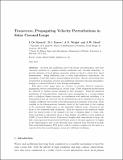Transverse, propagating velocity perturbations in solar coronal loops
Abstract
As waves and oscillations carry both energy and information, they have enormous potential as a plasma heating mechanism and, through seismology, to provide estimates of local plasma properties which are hard to obtain from direct measurements. Being sufficiently near to allow high-resolution observations, the atmosphere of the Sun forms a natural plasma laboratory. Recent observations have revealed that an abundance of waves and oscillations is present in the solar atmosphere, leading to a renewed interest in wave heating mechanisms. This short review paper gives an overview of recently observed transverse, propagating velocity perturbations in coronal loops. These ubiquitous perturbations are observed to undergo strong damping as they propagate. Using 3D numerical simulations of footpoint-driven transverse waves propagating in a coronal plasma with a cylindrical density structure, in combination with analytical modelling, it is demonstrated that the observed velocity perturbations can be understood in terms of coupling of different wave modes in the inhomogeneous boundaries of the loops. Mode coupling in the inhomogeneous boundary layers of the loops leads to the coupling of the transversal (kink) mode to the azimuthal (Alfven) mode, observed as the decay of the transverse kink oscillations. Both the numerical and analytical results show the spatial profile of the damped wave has a Gaussian shape to begin with, before switching to exponential decay at large heights. In addition, recent analysis of CoMP (Coronal Multi-channel Polarimeter) Doppler shift observations of large, off-limb, trans-equatorial loops shows that Fourier power at the apex appears to be higher in the high-frequency part of the spectrum than expected from theoretical models. This excess high-frequency FFT power could be tentative evidence for the onset of a cascade of the low-to-mid frequency waves into (Alfvenic) turbulence.
Citation
De Moortel , I , Pascoe , D J , Wright , A N & Hood , A W 2016 , ' Transverse, propagating velocity perturbations in solar coronal loops ' , Plasma Physics and Controlled Fusion , vol. 58 , no. 1 , 014001 . https://doi.org/10.1088/0741-3335/58/1/014001
Publication
Plasma Physics and Controlled Fusion
Status
Peer reviewed
ISSN
0741-3335Type
Journal item
Collections
Items in the St Andrews Research Repository are protected by copyright, with all rights reserved, unless otherwise indicated.

